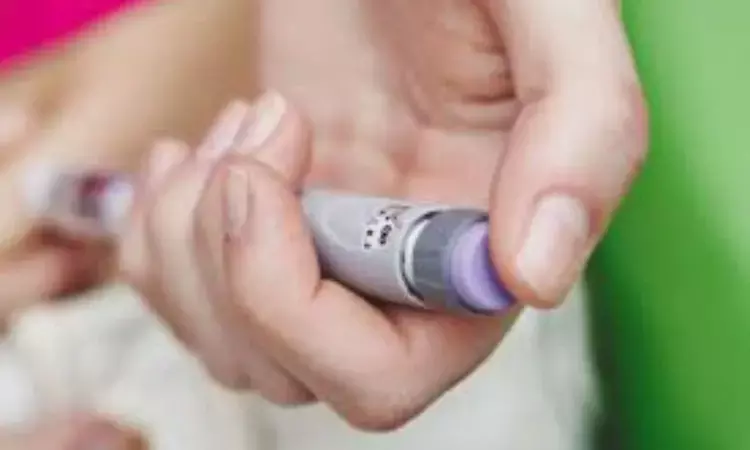- Home
- Medical news & Guidelines
- Anesthesiology
- Cardiology and CTVS
- Critical Care
- Dentistry
- Dermatology
- Diabetes and Endocrinology
- ENT
- Gastroenterology
- Medicine
- Nephrology
- Neurology
- Obstretics-Gynaecology
- Oncology
- Ophthalmology
- Orthopaedics
- Pediatrics-Neonatology
- Psychiatry
- Pulmonology
- Radiology
- Surgery
- Urology
- Laboratory Medicine
- Diet
- Nursing
- Paramedical
- Physiotherapy
- Health news
- Fact Check
- Bone Health Fact Check
- Brain Health Fact Check
- Cancer Related Fact Check
- Child Care Fact Check
- Dental and oral health fact check
- Diabetes and metabolic health fact check
- Diet and Nutrition Fact Check
- Eye and ENT Care Fact Check
- Fitness fact check
- Gut health fact check
- Heart health fact check
- Kidney health fact check
- Medical education fact check
- Men's health fact check
- Respiratory fact check
- Skin and hair care fact check
- Vaccine and Immunization fact check
- Women's health fact check
- AYUSH
- State News
- Andaman and Nicobar Islands
- Andhra Pradesh
- Arunachal Pradesh
- Assam
- Bihar
- Chandigarh
- Chattisgarh
- Dadra and Nagar Haveli
- Daman and Diu
- Delhi
- Goa
- Gujarat
- Haryana
- Himachal Pradesh
- Jammu & Kashmir
- Jharkhand
- Karnataka
- Kerala
- Ladakh
- Lakshadweep
- Madhya Pradesh
- Maharashtra
- Manipur
- Meghalaya
- Mizoram
- Nagaland
- Odisha
- Puducherry
- Punjab
- Rajasthan
- Sikkim
- Tamil Nadu
- Telangana
- Tripura
- Uttar Pradesh
- Uttrakhand
- West Bengal
- Medical Education
- Industry
Once-weekly insulin icodec better than once-daily insulin glargine for patients with type 2 diabetes: ONWARDS 4 trial

Belgium: Once-weekly insulin icodec performed equally well as once-daily insulin glargine U100 for glycemic control, required fewer basal insulin injections, and a lower bolus insulin dose with no increase in hypoglycaemic rates in type 2 diabetes patients, according to ONWARDS 4 trial. The trial findings were published in The Lancet on May 05, 2023.
Insulin icodec (icodec) is a basal insulin analogue appropriate for once-weekly dosing. Prof Chantal Mathieu, Catholic University of Leuven, Leuven, Belgium, and colleagues aimed to evaluate the safety and efficacy of once-weekly icodec versus once-daily insulin glargine U100 (glargine U100) in patients with long-standing type 2 diabetes on a basal-bolus regimen in the ONWARDS 4 trial. ONWARDS 4 is a phase 3a, randomised, open-label, multicentre, treat-to-target, non-inferiority trial.
The trial, conducted for 26 weeks, involved adults from 80 sites across nine countries (the USA, Russia, Romania, the Netherlands, Mexico, Japan, Italy, India, and Belgium). Five hundred eighty-two participants were randomly assigned in a ratio of 1:1 to receive once-weekly icodec (n=291) or glargine U100 (n=291) combined with 2–4 daily bolus insulin aspart injections.
Safety outcomes were assessed in the safety analysis set that comprised all participants randomly allocated to receive at least one dose of the trial product. The study's primary outcome was a change in HbA1c from baseline to week 26 (non-inferiority margin of 0·3 percentage points), evaluated in the complete analysis set, i.e. all randomly assigned participants. The mean duration of the participants with type 2 diabetes of 17·1 year.
The study revealed the following findings:
- At week 26, the estimated mean change in HbA1c was −1·16 percentage points in the icodec group (baseline 8·29%) and −1·18 percentage points in the glargine U100 group (baseline 8·31%), showing non-inferiority for icodec versus glargine U100 (estimated treatment difference 0·02 percentage points).
- 59% of participants in the icodec group and 57% in the glargine U100 group had an adverse event.
- Thirty-five serious adverse events were reported in 8% of participants in the icodec group, and 33 serious adverse events were reported in 9% of participants receiving glargine U100.
- Combined level 2 and level 3 hypoglycaemia rates were similar between treatment groups. No new safety concerns were identified for icodec.
Key strengths of this trial were:
- The use of masked continuous glucose monitoring.
- The inclusion of a large, diverse, and multinational population.
- The high trial completion rate.
Limitations include the open-label design and relatively short trial duration.
Reference:
Mathieu C, Ásbjörnsdóttir B, Bajaj HS, Lane W, Matos ALSA, Murthy S, Stachlewska K, Rosenstock J. Switching to once-weekly insulin icodec versus once-daily insulin glargine U100 in individuals with basal-bolus insulin-treated type 2 diabetes (ONWARDS 4): a phase 3a, randomised, open-label, multicentre, treat-to-target, non-inferiority trial. Lancet. 2023 May 5:S0140-6736(23)00520-2. doi: 10.1016/S0140-6736(23)00520-2. Epub ahead of print. PMID: 37156252.
Dr Kamal Kant Kohli-MBBS, DTCD- a chest specialist with more than 30 years of practice and a flair for writing clinical articles, Dr Kamal Kant Kohli joined Medical Dialogues as a Chief Editor of Medical News. Besides writing articles, as an editor, he proofreads and verifies all the medical content published on Medical Dialogues including those coming from journals, studies,medical conferences,guidelines etc. Email: drkohli@medicaldialogues.in. Contact no. 011-43720751


